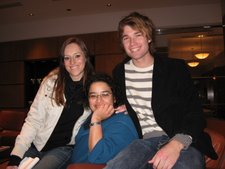Jonathan Swift was right
Note to my students: I don't have any more experience writing movie reviews than you do, so I thought I'd give it a try as well. What I learned is, the task of having to formally review a movie makes you a much more critical consumer of that movie. So, a valuable learning experience for all of us.
They had to cast an actor who could tapdance to play the part of Billy Flynn in the movie Chicago, so that, in the movie's climax, when Flynn is called upon to dap dance — metaphorically, to save his client — Richard Gere could do it for real.
This is a movie that is rife with heavy-handed metaphors, but their glamorous and stylized presentation makes their lack of subtlety forgivable. The movie gleefully harpoons the American frenzy to bestow celebrity status upon cold blooded killers, but by setting the film in jazz era Chicago, the audience is permitted, in a corner of their minds, to say to themselves, "Look how stupid people were back then. We would never be like that today!
(Of course not. Not with O.J. Simpson, or Robert Blake, and certainly not with Scott Peterson — who, for weeks was the lead story on Entertainment Tonight. As a Canadian, I was appalled by that.)
The film instructs us that we are fools, fed lies by oblivous newspaper journalists who themselves are nothing but puppets in the hands of a smooth talking lawyer in a sharktooth suit. Of the six murderers in the women's prison (Pop, Six, Squish, Uh Uh, Cicero, Lipshitz) only one is innocent, and because she can't speak the right language — English, or truth, depending on your perspective — she hangs. The only character with honorable intentions, Amos, is shown to be a fool for having them. And journalist Mary Sunshine, played ironically by the usually cyncical and sarcastic Christine Baranski, happily laps up the lies fed to her by Roxy Hart and her attorney, but can we really blame her? After all, wasn't it hard for you, watching the movie, to impune Roxy?
"He had it coming, he had it coming, it was a murder but not a crime," sing the prison six. Who among us men and women alike, hasn't felt that way, at one time or another?
As Roxy rehearses her fabricated life story, a story not one of the journalists bothers to verify, she avers that alcohol and jazz were her downfall. She plays to her audience. That's what American society wants to hear: that she didn't do it, and if she did, it wasn't her fault.
Jonathan Swift wrote, "Satire is a sort of glass, wherein beholders do generally discover everybody's face but their own." In Chicago's final dance number Roxy and Velma capitalize on their sins: they dance with rifles to the adulation of the crowd. And Roxy says, "Thank you! We could not have done this without you!"
Oh, how true.

No comments:
Post a Comment